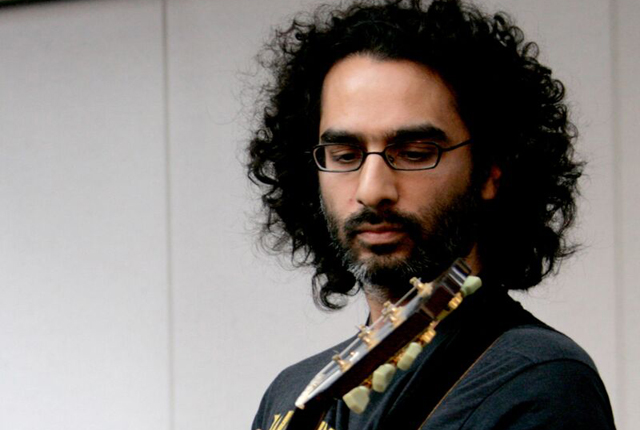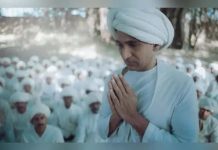By Gurmukh Singh
TORONTO: Indo-Canadian music composer Vikas Kohli is a hybrid kid who grew up imbibing both Indian and western cultures here. He armed himself with MBA and CFA degrees to become a fat corporate executive, but passion drove him to music and he ended up setting up Fatlabs Studios.
Today, he creates what he calls `Canadian masala’ by mixing Punjabi/Bollywood pop and western music.
If Kohli produced `Apun Ke Saath‘ for `Mission Istaanbul’ and Bollywood Monster Mash-Up for the IIFA show in Toronto in 2011, he also composed the title track for the Canadian Film Centre’s `Shanti Baba Ram & The Dancers of Hope’.
If he co-wrote Jennifer Abadesso’s chart-buster song `Did You Think’, he also produced multi-million album selling Mika Singh.
Working with different genres of music, he says, has helped him sub-consciously create what can be termed be hybrid music.
Sitting in his fabulous Fatlabs, the young composer says, “The hybrid is simply the result of my many musical influences growing up watching Indian Cinema and living in Canada. I subconsciously incorporated western song structures, harmonies and various world instruments into the Bollywood and non-Bollywood songs I work on. I work on so many different musical genres that everything becomes it’s own unique “Canadian Masala.’’
Having worked with international musicians of punk, jazz, hip-hop, country music, metal, and Bollywood pop, he thinks Bollywood pop is now right up there with western pop.
“Bollywood pop seems to converging with western pop in the sense that the songs are focused on getting a catchy hook upfront and Bollywood pop is using more and more the ideas of harmony and non-swing rhythms. The production of pop all around the world is similar with a strong emphasis on production quality, tempo-locked beats, and club-friendly tracks,’’ Kohli says.
As an after thought, he adds quickly, “The truth is that I see similarities between punk, hip-hop and Bollywood pop and the challenge is in trying to do something unique in each of those genres of music. Perhaps I see the differences from my mathematics background. It’s all about pattern recognition and the aesthetics of symmetry and proportion.’’
So does he see Bollywood pop as the next big thing on the global stage?
“Oh, yeah, absolutely. Bollywood pop and pop from other countries of the world is converging to some global notion of pop. In Canada, the Bollywood CDs and DVDs sit beside the Maroon 5 and Rihanna CDs in our department stores.
“When I bring a Bollywood singer to Canada to perform or work on a project, after the concert all my non-Indian friends will have the songs stuck in their heads. A good melody and a danceable beat reaches everyone.’’
According to Kohli, Kalyanji & Anandji as well as SD & RD Burman are among his idols. “They were great at doing what Indian culture has always been great at doing – absorbing outside influences and making them into their own. At the same time, I’m equally influenced by North American music producers such as Rick Ruben and Hollywood film composers such as James Horner. I draw from all the influences that surround me, and it all finds it’s way into the music I create.’’
Apart from composing `Apun Ke Saath’ in `Mission Istaanbul’, Kohli created a fusion concert production called Bollywood Monster Mash-Up for the IIFA show in Toronto last year
Calling it one of the high points of his career, he says, “We had 54 performers, including Monali Thakur, members of the Toronto Symphony Orchestra and over 15,000 people attended the
show.’’
His fascination with an emerging India and Bollywood has led him do a double length feature documentary about the rise of mall culture in India titled “MallaMall.”
Not surprisingly, he has quite a few India and Bollywood-centric projects on his hands.
“Before I start composing for the trilogy film “Calcutta Taxi”, I’m producing the return of Bollywood Monster Mash-Up in which we have over 80 performers, including rising Bollywood star Rajdeep Chatterjee, as well as dancers, western choirs singing Bollywood, and a nostalgic trip through Asha Bhosle’s classics from the gangster films of the 70s,’’ says Kohli.
Any regrets about chucking a lucrative career in corporate world?
“Only that I used to get more sleep,’’ he says with a big smile.
Kohli’s family originally hails from Lahore. “After partition, we left for Delhi. Now we are in India, Britain, the US and Canada. We are absolutely proud of our Punjabi, Indian roots,’’ he says.
(This article first appeared in the Times of India)






